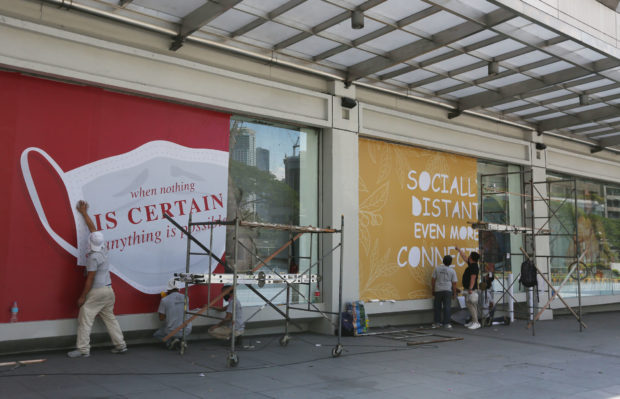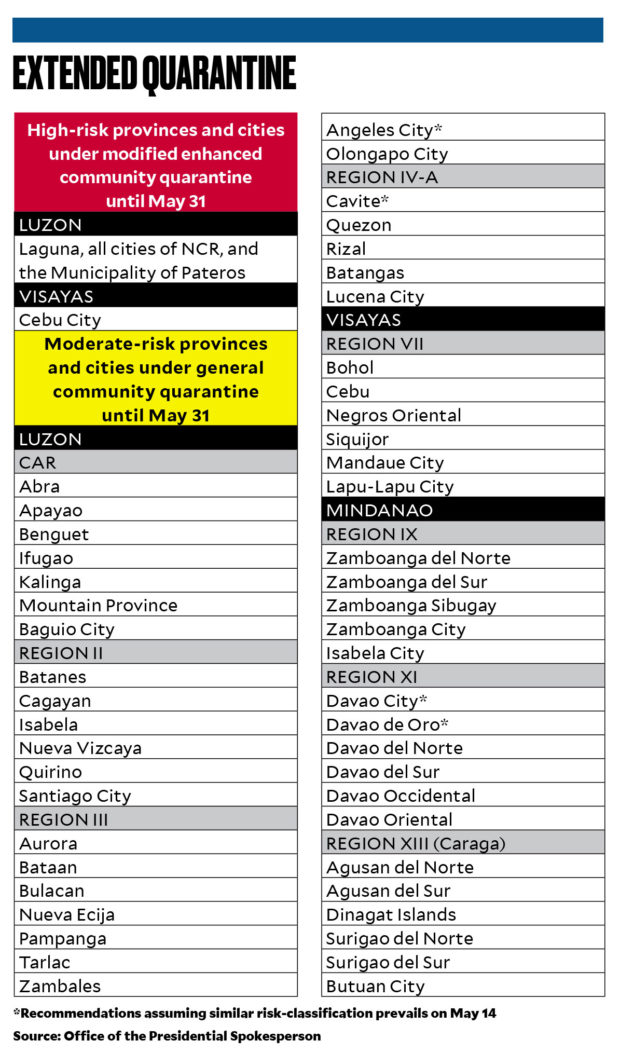Eased lockdown till May 31 in Metro Manila, Cebu City, Laguna

FOR LIMITED SHOPPING Workers spruce up shop windows along Ayala Avenue in Makati City as shopping malls in Metro Manila prepare for partial reopening with the easing of lockdown restrictions beginning this weekend. Retailers expect the government to allow limited shopping as part of a phased exit from quarantine to resuscitate the economy. —MARIANNE BERMUDEZ
MANILA, Philippines — Lockdown measures will be eased in much of the country beginning Saturday, but Filipinos cannot return to their old ways because the new coronavirus remains a threat to public health, Malacañang said on Tuesday.
President Rodrigo Duterte earlier on Tuesday announced an extension of lockdown measures to May 31, making it among the world’s longest community quarantines to try to halt the coronavirus pandemic.
He said his decision was based on the recommendation of the Inter-Agency Task Force on Emerging Infectious Diseases, the temporary government body overseeing his administration’s response to the pandemic.
Metro Manila, Laguna province and Cebu City — ”high-risk” areas for the transmission of the coronavirus—will remain on “enhanced community quarantine,” or lockdown, which will be “modified” to allow the easing of movement and business curbs to begin a phased revival of the economy, he said.
‘Can’t afford second wave’
Forty-one provinces and 10 cities considered “moderate risk” for coronavirus infection would ease into “general community quarantine” from Saturday, while the community quarantine in 40 provinces and 11 cities held to be “low risk” for infections would be lifted. (See table.)
Duterte said the loosening of quarantine restrictions did not mean the health crisis was over, but that the measures were being eased slowly to prevent a resurgence of the coronavirus.
“We cannot afford a second and a third wave” of infections, he said as he appealed to the public to obey the quarantine rules.
Speaking at a televised press briefing after Duterte’s announcement, presidential spokesperson Harry Roque said local governments that would be freed from community quarantine should still implement minimum health standards to prevent a spike in infections.
“[A]s long as there is no vaccine, we must observe minimum health standards. These are social distancing, good hygiene, temperature [check and other measures] prescribed by the Department of Health (DOH),” Roque said.
Improvement of health systems
Health Undersecretary Maria Rosario Vergeire identified the other measures as staying healthy; frequent hand-washing, observing cough etiquette and avoiding going out when sick; preventing transmission by naming coronavirus cases so that they could be isolated.
Vergeire urged local officials to use the phased exit from lockdown to improve their health systems and ensure that the public complies with minimum health standards “so we could prepare and eventually be ready in the event that the risk level shifts to moderate or high risk.”
As of Tuesday, the Philippines had more than 11,000 confirmed coronavirus cases, with over 750 deaths.
Globally, the new coronavirus has sickened more than 4.19 million people and over 280,000 have died.
Roque said the modified lockdown would allow limited movement for buying necessities and getting essential services and reopening of selected manufacturing and processing plants up to a maximum of 50 percent of the workforce.
Work in government offices could also resume, but only up to 50 percent of the workforce would be allowed to return to their jobs.
Public transportation would also be allowed but only for buying necessities and ferrying people who would be allowed to return to work. Roque said the task force would release guidelines for limited reopenings on Wednesday.
‘Transition phase’
School will remain suspended throughout the country, he said.
“It is a transition phase. After a month, we may shift to general community quarantine,” Roque said.
He also explained the proposed zoning, or classifying barangays according to the number of coronavirus cases they have..
Under the proposal, critical zones are areas with more than 20 infections per 100,000 population. Containment zones are areas with one to 19 cases per 100,000 population.
Buffer zones are areas without infections but contiguous with localities with confirmed cases. Outside buffer zones are areas outside buffer zones and have no infections.
Roque said local governments would use zoning in classifying barangays. He said stricter lockdown would be imposed on critical zones and easier quarantine rules would be implemented in containment zones.
Buffer zones may be placed under general community quarantine, while outside buffer zones may be put on modified general community quarantine, he said.
Senate President Vicente Sotto III said he supported the President’s decision to extend the lockdown, as it was based on “solid data” provided by health experts and other authorities.
Sen. Bong Revilla said transportation officials and operators of public transport should ensure the protection of people taking rides as they returned to work.
Mass testing
Some business groups expressed support for the extension of the lockdown in Metro Manila but stressed the importance of mass testing to suppress the spread of the coronavirus.
“It’s a necessary evil,” Francis Lim, president of the Management Association of the Philippines, said, referring to the extension of the lockdown. “The areas that will continue to be under [lockdown] must speed up massive testing . . . otherwise they will leave the President no choice but to extend it again.”
“Maybe that’s OK, because at least there is a little change showing that we should move on, except that the implementers should think very well how it would happen,” said Sergio Ortiz-Luis Jr., president of the Employers Confederation of the Philippines.
“Even if we allow certain industries or certain work to go through in [Metro Manila], considering that some areas are under [lockdown], I don’t know how the workers can move out and go to their place of work,” he said.
Domestic airlines said they were waiting for final guidelines from the government to resume flights to provinces that were easing quarantine measures.
“We are still eyeing May 16 [to resume flights] depending on the government’s guidelines,” said David de Castro, communications chief at AirAsia Philippines.
Philippine Airlines spokesperson Cielo Villaluna and Cebu Pacific director for communications Charo Logarta Lagamon said the carriers were waiting the government’s go-signal.
—WITH REPORTS FROM JOVIC YEE, KRISSY AGUILAR, MARLON RAMOS, ROY STEPHEN C. CANIVEL AND MIGUEL R. CAMUS
For more news about the novel coronavirus click here.
What you need to know about Coronavirus.
For more information on COVID-19, call the DOH Hotline: (02) 86517800 local 1149/1150.
The Inquirer Foundation supports our healthcare frontliners and is still accepting cash donations to be deposited at Banco de Oro (BDO) current account #007960018860 or donate through PayMaya using this link.
